
Opening story
Five questions for Robbert Dijkgraaf
Infographic For everyone who can, wants and dares to do more
Pre-U
‘Academic thinking was rammed into it’
04 06 09 10 12 16 18
Community building Learning and socialising
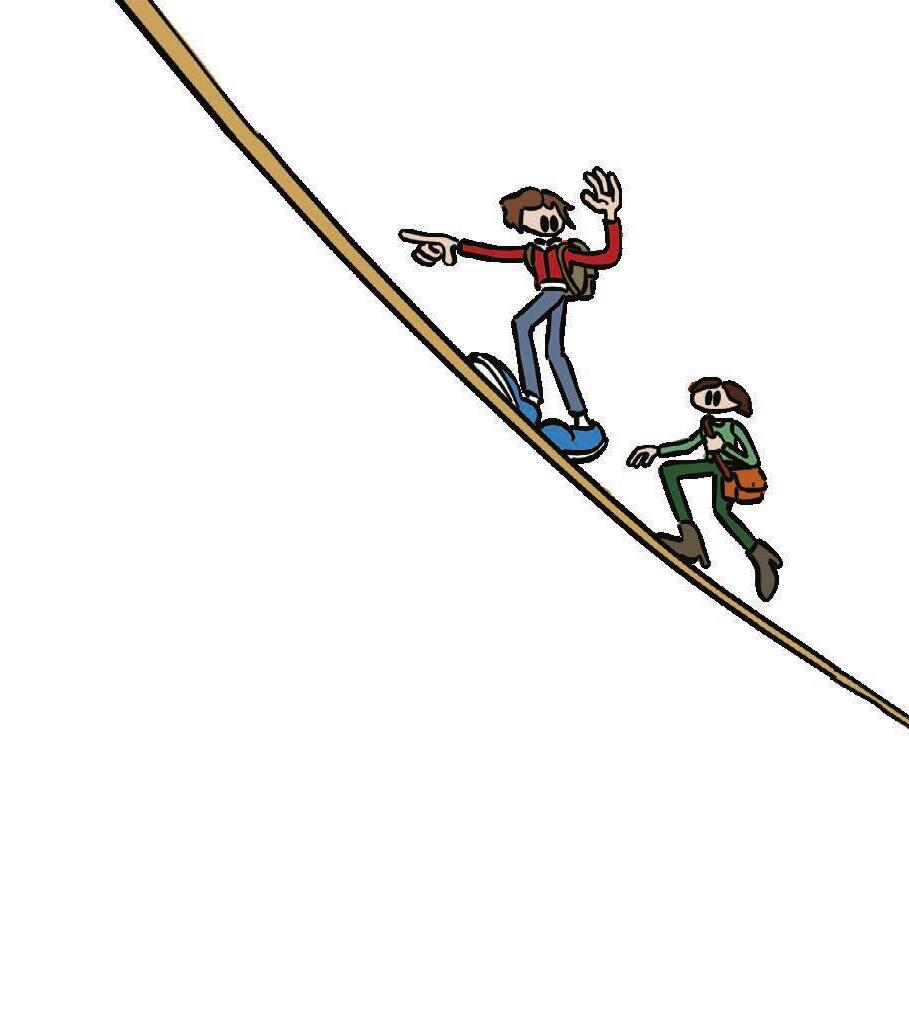
‘Proud that our approach is working’ Programme directors and coordinators about the honours programme
22
Column
Finding where you belong
11-15-21
The teacher #1, #2 and #3
Students have a say ‘You need a certain level of commitment’
Alumni have a say ‘It ticked all the right boxes’
Colophon
This magazine is a production with input of the honours programmes in the Netherlands. The magazine was created in collaboration with U-Today, the independent news medium of the University of Twente. With its publication, Honours education in the Netherlands celebrates its fifteenth anniversary.
Editorial staff
Maaike Platvoet (editor-in-chief U-Today), Ditta op den Dries, Rense Kuipers, Sandra Pool and Stan Waning (team U-Today) and UT student Meggie Stempher (column).
Coordination
Sandra Pool (U-Today) and Marie-Laure Snijders (Honours programme University of Twente)
Photography
Frans Nikkels en Rikkert Harink
Cover design and illustrations
LUVANE
Design & layout
Jeremiah Wetzel, DesignSpark
Print De Bondt Grafimedia Communicatie
2

Take the lead!
Fifteen years of honours education. At the time, the University of Twente was one of the first universities in the Netherlands to offer an honours programme. It’s precisely because of this that it gives us great pleasure to present this special magazine, which celebrates fifteen years of honours education in the Netherlands.

Honours education is intended for students who want to go the extra mile, who are looking for a challenge, who have the ambition to receive extra education alongside their ‘regular programme’. These are elements that are present in many of the stories in this magazine. Honours was initiated to create ‘highlands with peaks’. We had to get rid of the culture of mediocrity in education, mainly because we had a knowledge economy to fuel.
Over the past fifteen years, honours education has had a lot of ground to cover, because initially hardly any extra challenges were being offered to motivated students. After all, at the time it was rather ‘un-Dutch’ to pay extra attention to these talented individuals in our egalitarian country, where if you stand out from the crowd you might be pulled back in.
But look what we’ve achieved in fifteen years! In the past years, honours education has evolved into a valued component of the Dutch education system. And this applies to vocational, higher professional and university education. Honours education hasn’t only challenged outstanding students to push their boundaries and activate their intellectual curiosity, but it has also encouraged teachers and education institutions to innovate and embrace excellence.
We would like to express our appreciation for everyone – students, teachers and educational developers – who have contributed to the success of honours education in the Netherlands. Together, we’ve created a community of learning and innovation that we can be very proud of.
This magazine gives a varied overview of the impact of honours education. You’ll read stories from students who accepted the challenge, teachers who’ve become inspiring coaches and institutes that innovated to create an environment where excellence thrives. And then there are alumni who tell us about how their time as honours students benefit them in their work.
While we look back at our achievements, it’s also important to look ahead. The world is changing rapidly and the challenges we face are increasingly complex. Honours education is in a unique position to prepare students for these challenges by equipping them with the extra skills, knowledge and mindset needed to take the lead in a quickly evolving society. Also for the future.
So let’s raise our glass to the success of fifteen years of honours education and let’s look ahead to the next phase of this exciting adventure with great confidence and even more enthusiasm.
We wish you happy reading!
Nelleke van Adrichem-Rotteveel (Honours Programme Director ) and Marie-Laure Snijders (Honours Education Coordinator), Honours programme University of Twente

FOREWORD 15 YEARS OF HONOURS EDUCATION 2024 3
For everyone who can, wants and dares to do more
This map of the Netherlands shows the number of educational institutions that offer honours programmes to students who can, want and dare to do more. Honours education can be found at vocational, higher professional and university education and is very diverse. Currently, there are 89 Honours Programmes in the Netherlands. Because of the higher number of offerings it is difficult to present honours in its entirety, but the list is growing.
2 14 19 24 26 7 28 31 34 35 37 38 39 40 42 4 8 7 6 47 49 52 53 55 57 61 64 95 82 108 70 118 96 83 109 76 120 99 87 110 113 73 100 93 69 71 106 126 1 5 15 13 17 18 20 22 23 29 41 45 46 48 59 66 68 72 75 78 79 80 81 86 89 90 91 94 97 98 101 102 104 107 112 117 119 121 122 125 128 4
Universities
Vrije Universiteit Amsterdam | Universiteit van Amsterdam | Technische Universiteit Delft | Technische Universiteit Eindhoven | Universiteit Twente | Rijksuniversiteit Groningen | Universiteit Leiden | Universiteit Maastricht | Radboud Universiteit Nijmegen | Erasmus Universiteit Rotterdam | Universiteit van Tilburg | Universiteit Utrecht | Wageningen Universiteit
Higher professional education
Hogeschool van Amsterdam | Gerrit Rietveld Academie | HAN University of Applied Sciences | ArtEZ University of the Arts | Avans Hogeschool | Haagse Hogeschool | Christelijke Hogeschool Ede | Saxion Hogescholen | Fontys Hogescholen | Design Academy Eindhoven | Hanzehogeschool Groningen | Hogeschool Tio | NHL Stenden Hogeschool | Hogeschool Leiden | Hogeschool Utrecht | Hogeschool voor de Kunsten Utrecht | Hogeschool Inholland | Hogeschool Rotterdam | Islamitische Universiteit Rotterdam | HZ University of Applied Sciences | Hogeschool Viaa | Christelijke Hogeschool Windesheim
V ocational education
Aeres Groep | Alfa-College | Aventus | Cibap | Deltion | Drenthe College | Firda | Landstede MBO | Menso Alting | Noorderpoort | Onderwijsgroep Noord | ROC van Twente | Zone.college | VONK | Grafisch Lyceum Utrecht | Hoornbeeck College | MBO Amersfoort | MBO Utrecht | Mediacollege Amsterdam | Nimeto Utrecht | Regio College | ROC Horizon College | ROC Midden-Nederland | Nova College | ROC TOP | ROC van Amsterdam en Flevoland | Albeda | Yuverta | Grafisch Lyseum Rotterdam | HMC MBO | Leidse Instrumentmakers school | Lentiz Onderwijsgroep | mboRijnland | ROC Da Vinci College | ROC Mondriaan | Scalda
Vakopleiding food | Zadkine | VISTA college | Gilde Opleidingen | Graafschap College | Koning Willem 1 College | Onderwijsgroep Tilburg | Rijn IJssel | ROC A12 | ROC Nijmegen | ROC Rivor | ROC Ter AA | Curio | Scholengemeenschap De Rooi Pannen | Sint Lucas | Summa College
1 Aalsmeer | 2 Alkmaar | 3 Almelo | 4 Almere | 5 Alphen aan den Rijn | 6 Amersfoort | 7 Amstelveen | 8 Amsterdam | 9 Apeldoorn | 10 Appingedam | 11 Arnhem | 12 Assen | 13 Barendrecht | 14 Barneveld | 15 Beek | 16 Bemmel | 17 Bergen op Zoom | 18 Boxtel | 19 Breda | 20 Brielle | 21 Buitenpost | 22 Capelle aan den IJssel | 23 Cuijk | 24 Delft | 25 Delfzijl | 26 Den Bosch | 27 Den Haag | 28 Den Helder | 29 Deurne | 30 Deventer | 31 Diemen | 32 Dieren | 33 Doetinchem | 34 Dokkum | 35 Dordrecht | 36 Drachten | 37 Dronten | 38 Edam | 39 Ede | 40 Eindhoven | 41 Elst | 42 Emmeloord | 43 Emmen | 44 Enschede | 45 Geldermalsen | 46 Geleen | 47 Goes | 48 Gorinchem | 49 Gouda | 50 Groenlo | 51 Groningen | 52 Haarlem | 53 Haarlemmermeer | 54 Hardenberg | 55 Harderwijk | 56 Heerenveen | 57 Heerhugowaard | 58 Heerlen | 59 Helmond | 60 Hengelo | 61 Hilvarenbeek | 62 Hoogeveen | 63 Hoogezand | 64 Hoorn | 65 Horst | 66 Houten | 67 Kampen | 68 Katwijk aan Zee | 69 Koog aan de Zaan | 70 Leeuwarden | 71 Leiden | 72 Leidschendam-Voorburg | 73 Lelystad | 74 Maasbracht | 75 Maasland | 76 Maastricht | 77 Meppel | 78 Middelburg | 79 Middelharnis | 80 Mierlo | 81 Nieuwegein | 82 Nijkerk | 83 Nijmegen | 84 Nuth | 85 Oostland | 86 Oss | 87 Purmerend | 88 Raalte | 89 Renkum | 90 Rijnsburg | 91 Rijswijk | 92 Roermond | 93 Roosendaal | 94 Rosmalen | 95 Rotterdam | 96 Schagen | 97 Schiedam | 98 Schoonhoven | 99 Sittard | 100 Sneek | 101 Spakenburg | 102 Spijkenisse | 103 Stadskanaal | 104 Stellendam | 105 Terborg | 106 Terneuzen | 107 Tiel | 108 Tilburg | 109 Urk | 110 Utrecht | 111 Veendam | 112 Veenendaal | 113 Veghel | 114 Velp | 115 Venlo | 116 Venray | 117 Vlaardingen | 118 Vlissingen | 119 Waddinxveen | 120 Wageningen | 121 Weert | 122 Westland | 123 Winschoten | 124 Winterswijk | 125 Woerden | 126 Zaandam | 127 Zevenaar | 128 Zoetermeer | 129 Zutphen | 130 Zwolle
| SOMA College | STC-Group | SVO
3 10 11 12 21 25 30 33 34 36 43 44 9 51 54 56 60 62 63 67 115 130 99 103 92 77 123 129 88 111 114 16 32 46 50 58 65 74 84 85 105 116 124 127
15 YEARS OF HONOURS EDUCATION 2024 5
FIVE QUESTIONS ABOUT TALENT DEVELOPMENT FOR ROBBERT DIJKGRAAF
‘The strength lies in bringing together different perspectives’
Outgoing Minister of Education, Culture and Science, Robbert Dijkgraaf, thinks that anyone who wants to do something extra alongside their studies should be given this opportunity. In his opinion, talent development isn’t tied to any type of education in particular. ‘I’m happy to see that this magazine and your 15 Years of Honours conference are a collaboration between vocational, higher professional and university education.’
Honours education in the Netherlands has existed for fifteen years. What’s your view on these extracurricular programmes?
‘The milestone of fifteen years also marks my initiation to honours in the Netherlands. I was involved in the founding of the Sirius programme, which at the time was responsible for putting honours programmes in university and higher vocational education on the map. I’m happy to see the movement that started back then is still very much alive today.
I see honours as programmes for students that are willing and able to do more. It actually appeals to several talents in a student. It’s not only for students who excel in one particular discipline, but also – and especially – for those who have a broad interest. An example would be an entrepreneurial student of Physics who wants to know more about starting a successful business. Or a nurse in training who’s also interested in technical healthcare systems.
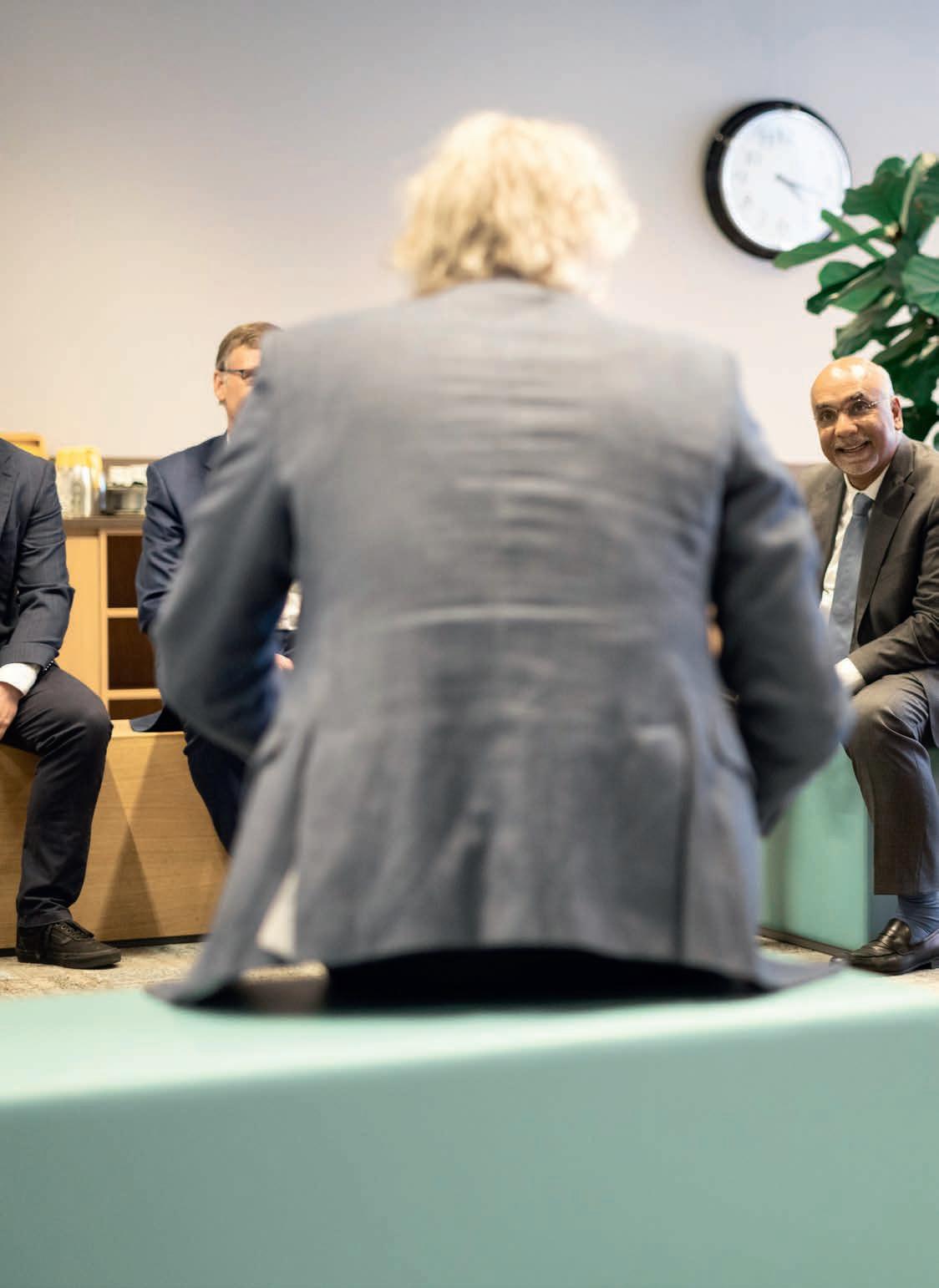
In addition to an academic challenge, it also provides a unique opportunity to familiarise yourself with other educational programmes and to make contact with people
outside of your own programme. You often meet other students during social activities or while playing sports or going out, but honours allows you to establish contact with people from other programmes in a study setting. That can be a very valuable addition to student life.
I also see honours programmes as testing grounds, if you will, being the first to trial things before they are adopted by regular education. Consider, for example, how there is room for personal development. That’s something all educational programmes could use to their advantage. However, after fifteen years, I am particulary pleased to see that this magazine and your conference are a collaboration between senior secondary vocational education (mbo), higher vocational education (hbo) and university education (wo). Because talent development isn’t tied to any type of education in particular. Everyone who’s willing and able should get the chance to do something extra.’
What ingredients do honours programmes need to keep offering interesting and relevant challenges in the future?
‘The objective of honours isn’t only to encourage students to achieve more, but also to challenge them
6
Thinking outside your own educational programme’s bubble can lead to revolutionary insights
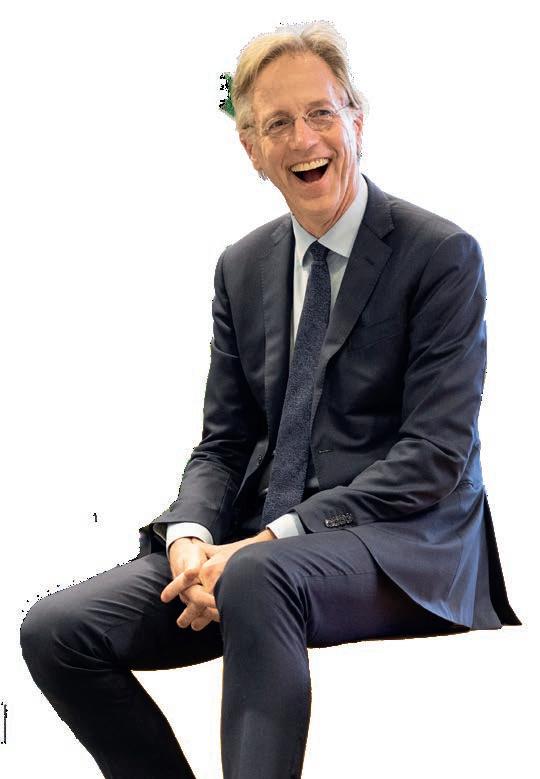
to explore various disciplines and interconnect them. Students learn to approach different issues creatively.
That is not only educational, but also very valuable in the workplace. It would be great if education institutions could collaborate with employers even more. That way, you ensure honours education really links up to the labour market and to the major societal issues we are currently facing. Take the energy transition, for example: at the honours programme on sustainability at the University of Amsterdam, students take on a sustainability challenge for existing companies.

In mbo, I’m already seeing frequent examples of this collaboration with the business community. Take the professional competitions for mbo students, Skills Heroes, where companies are also involved. This means that assignments students have to carry out are very realistic
and based on the latest knowledge and technologies.
In the interest of meeting all of those major societal challenges, it would be great if mbo, hbo and wo honours programmes collaborated with each other and with the professional field even more. Then honours education could even become the first in tackling complex issues and working with the latest technologies.’
What overarching characteristics do these programmes have that contribute to the talent development of students?
‘The strength of all these programmes mainly lies in bringing together different perspectives. The success isn’t just measured in achievements, but also in the extent to which students use their curiosity and creativity in various disciplines.
15 YEARS OF HONOURS EDUCATION 2024 7
For this exact reason, I’m calling for greater collaboration between mbo, hbo, and wo in excellence and honours programmes. This would allow us to combine the practical side of the mbo students, the applied side of the hbo students and the theoretical side of the wo students. They learn to appreciate each other and their different perspectives. That’s something I see in the Challenge Week 040, for example, where students from Fontys University of Applied Sciences (hbo), the Summa College (mbo) and Eindhoven University of Technology (wo) collaborate on diverse challenges.
Another impressive collaboration is the Waddenlab. There, students research how we can keep the Wadden Sea healthy.
That’s not a simple matter, because the Wadden Sea is a complex area. It’s about pollution, sensitive nature, a complex ecosystem. Such a project acquaints students with complex questions we need to answer if we wish to progress as a society. Several hbo and wo institutions participate in the Waddenlab and last year mbo also joined. We have a great need for all of that talent, regardless of whether you study at the mbo, hbo, or wo level.’
Statement: Every education institution must offer an honours programme for talented students.
‘I think it’s important that within wo, hbo and mbo, you have various opportunities to develop your talents. This way, students can decide for themselves what suits them best. There are also other ways of making the most of your studies. For instance, here in the Netherlands we have specific
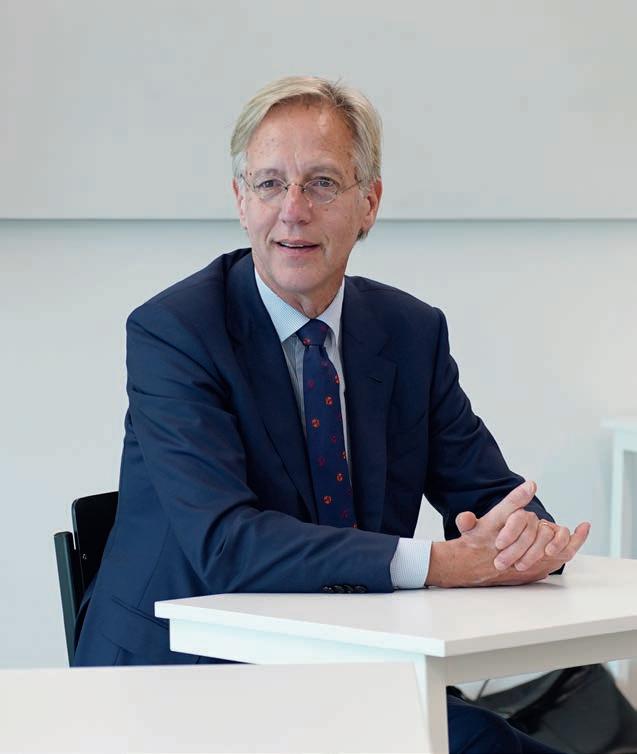
programmes requiring an above-average effort, such as the University College. But students can also sign up for an administrative year. At the Albeda College, Zadkine mbo and InHolland University of Applied Sciences, there’s the Fast Track Legal. That’s an excellence track where students can complete their mbo law degree (level 4) and the first year of the hbo law programme in three years.
At the same time, I see that talented mbo students don’t always have the same number of opportunities as their peers in hbo and university. That’s why in 2015, a funding scheme was set up for excellence in mbo. For instance, in 2018, Stichting Netwerk MBO Excellent (MBOe) was founded to further advance the development of excellence in mbo. Honours/excellence education doesn’t have a longstanding tradition in mbo. That’s something that needs to grow over time. I hope the future governments will continue making progress in this respect.’
In your opinion, how do honours programmes contribute to preparing students for the professional field? What purpose does multidisciplinary learning serve and how does it benefit society?
‘Multidisciplinary learning and thinking can benefit society a great deal. An example that comes to mind is the collaboration on the development and construction of mechanical and electronic infrared detection systems to study the universe. This is the product of very close collaboration between SRON (an institute of the Dutch Research Council), Delft University of Technology (wo), Utrecht University of Applied Sciences (hbo) and the Leiden Instrument Makers School (mbo) over the past few years. These detectors are already being used by the Atacama Large Millimeter Array (ALMA) in Chile. Students that worked together here got to know and appreciate each other and each other’s expertise. In other words, thinking outside your own educational programme’s bubble can lead to new and sometimes even revolutionary insights.
But talent development goes beyond education. In the best-case scenario, companies build on this and also offer employees the opportunity to continue developing. This is why more awareness of honours programmes and excellence should be raised with employers. They often don’t know students completed such a programme and how it could benefit them. Research by the Netherlands Initiative for Education Research (NRO) on ‘making talent work’ to realise the full potential of talent development also offers suggestions to change this state of affairs.’
8
Finding where you belong
My ‘Honours journey’ began with the Bachelor Honours programme, in my first year of my study Biomedical Technology, which I started in 2018. We were a hand full of students in the Science track. Since then, Honours has been a special journey for me.
First and foremost, Honours felt like coming home. Looking back, Honours provided me with the motivation and energy boost I needed for my everyday-studies. I met more like-minded students, who are now among my best friends. Even though the lectures were during evening hours, I was always looking forward to seeing my peers. Rather regularly, we completely forgot about time and ended up almost being locked inside the building after closing due to our lively and joyful discussions. And that experience was very much thanks to our devoted teachers. For me, the teachers made it feel like I had found where I belonged. And that combination of being part of an actual community and being valued made me come back after a few years, to join the Master Honours programme, Change Leaders, which is focused on developing knowledge, attitude and skills related to leadership and change. Again, I felt recognised and appreciated. Like my abilities and talents were seen, encouraged and applauded. For me, that combination of being part of a community and being valued is what Honours stands for.
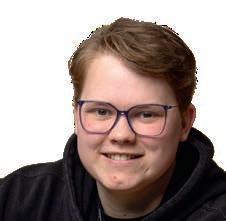

great academic challenge. I wrote a proposal for applying gene therapy to treat breast cancer. I think cancer research is incredibly meaningful and impactful and as such, the project was driven by intrinsic motivation and a chance to really pursue your own ideals and passions. It formed the basis for my future career plans and for my internship at the Princess Maxima Centre, Europe’s largest paediatric oncology research and treatment centre.
My graduation project of the master’s honours programme focused on the application of sport as a means to improve the mental well-being of students. A subject that, especially since the sudden death of a friend, is very important to me. With this project, I have seen how the mental health of my fellow students improved and with that, Honours was a way for me to express myself and my emotions and to dedicate myself to a greater social cause.
With this, the programme became a way to express myself. In the Bachelor Honours programme, we were given the freedom to choose topics of our own interest for the various projects and essays. As a final individual project, we were challenged to write a Veni proposal, a prestigious research grant. Writing such an official proposal was a
I met more like-minded students
Although I am still a master’s student, I returned to the honours programme again, but this time as a guest speaker. As a result, I got to know the program from a completely new and different perspective. It gave me a nice feeling to contribute to the programme, and hopefully also to the personal and professional development of the new batch of students.
I know I can always knock on the door of my honours lecturers. I still speak to them and my fellow students on a regular basis. Some will even be present at my graduation. That’s why I will always feel connected to the honours programmes.
Meggie Stempher, Masterstudent Biomedical Engineering, University of Twente
COLUMN
15 YEARS OF HONOURS EDUCATION 2024 9
‘Academic thinking and working was rammed into it’
Renske de Vries received honours education in secondary school under the flag of Pre-U, the University of Twente’s pre-university programme. The most important thing she learned? ‘If it weren’t for this programme, I wouldn’t be the person I am today.’
For eighteen months, De Vries could be found on the university campus every Thursday afternoon, together with around twenty other pupils. ‘The first year was all about taking classes, for instance on conducting research and philosophy of science. The second year revolved around writing and presenting a paper.’ She learned about what’s true and how you know it is. That was the pivotal question for almost everything. ‘I learnt you shouldn’t just accept something as the truth. Yes, they really hammered home the importance of working and thinking like an academic.’
Advantage
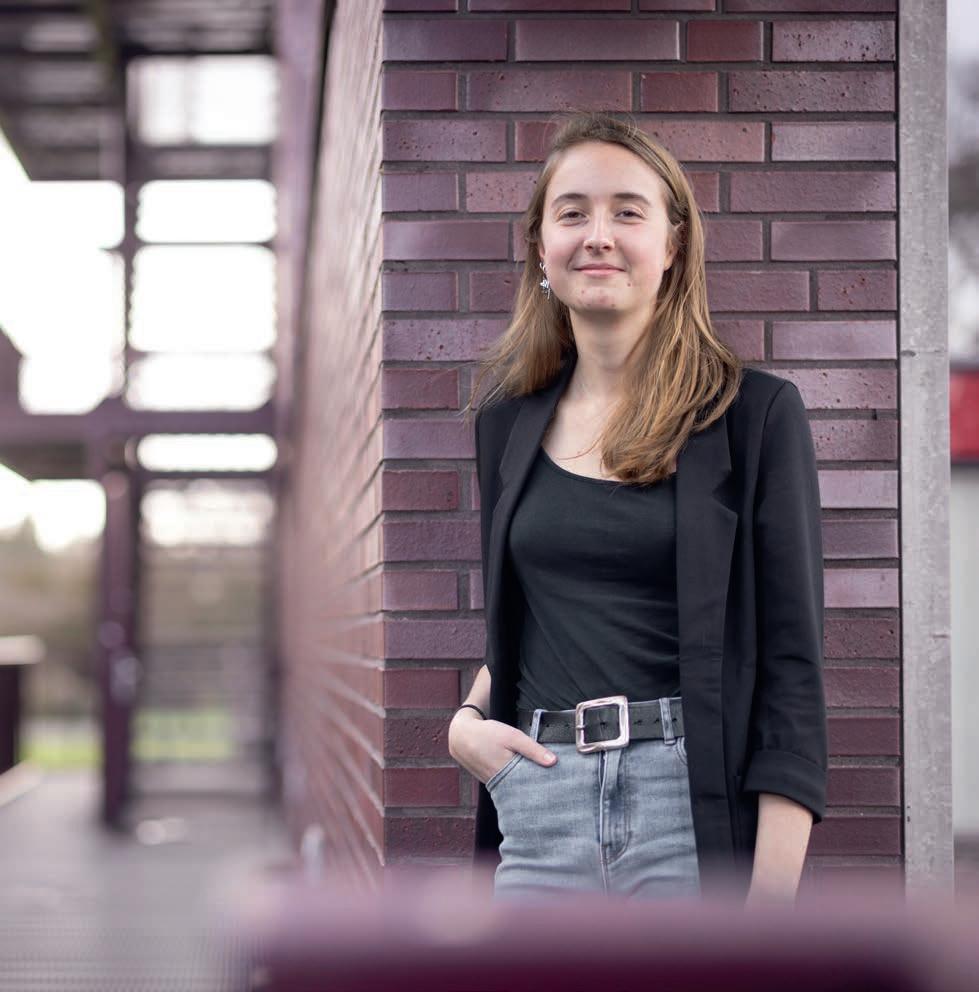
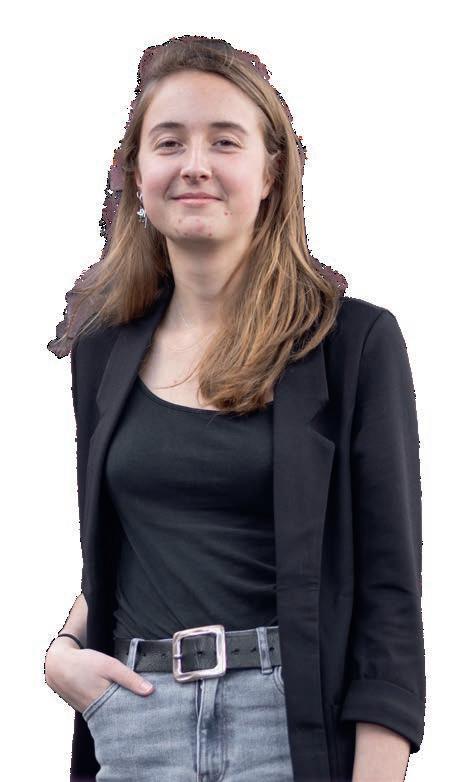
Pre-U Honours programme at the University of Twente
She decided to study Civil Engineering at the University of Twente. ‘You do notice you have an advantage in a number of ways. In projects in particular, but also in class. You approach things differently.’ But getting there wasn’t easy, De Vries admits. ‘While doing the Pre-U honours programme, I noticed others were much more skilled at writing a paper than I was. With me, it all clicked just in time, when I realised it doesn’t matter if you make mistakes. The great thing about the honours programme is that everyone takes from it what they need.’
Radical change
‘In my case, what I needed was to be myself. Or rather: to become myself.’ To this end, De Vries decided to make a radical change with respect to her academic career, switching from Civil Engineering to a pre-Master’s in Educational Science. One day, she wants to be a forensic child psycholo-
The University of Twente’s Pre-U Honours programme gives all pupils in pre-university education the opportunity to become acquainted with academic education at a young age. In this programme, pupils in the fifth and sixth year of pre-university education work intensively on their personal development, but also on their research and academic skills.
gist. ‘Or perhaps something else involving children, or sport, or management. I’ll see. You only live once and for now, I’m keeping my options open.’
She adopted this attitude thanks to her experience with the Pre-U honours programme, she says. ‘If you had told me in fourth grade of secondary school that I would suddenly switch to a totally different educational programme, I would’ve said you were crazy. I was used to playing it safe, but now I dare to take risks. If I hadn’t completed this programme, I would’ve never done this. I wouldn’t be the person I am today.’
10
Text: Rense Kuipers Photo: Rikkert Harink
‘They’re constantly looking
for depth’
In 2019, Bram Hoonhout started working as a coordinator for the Honours Academy at Leiden University. In September 2023, he became an education developer. He also teaches classes himself.
Text: Ditta op den Dries Photo: From personal archives
Hoonhout thinks it’s a great challenge to get students to step outside their comfort zones and to design classes in such a way that it forces them to look at a subject differently. In his experience, there’s nothing honours students love more. ‘They’re constantly looking for breadth and depth. This requires their teachers to stay innovative, both in terms of subjects and didactics.’
Designing your life
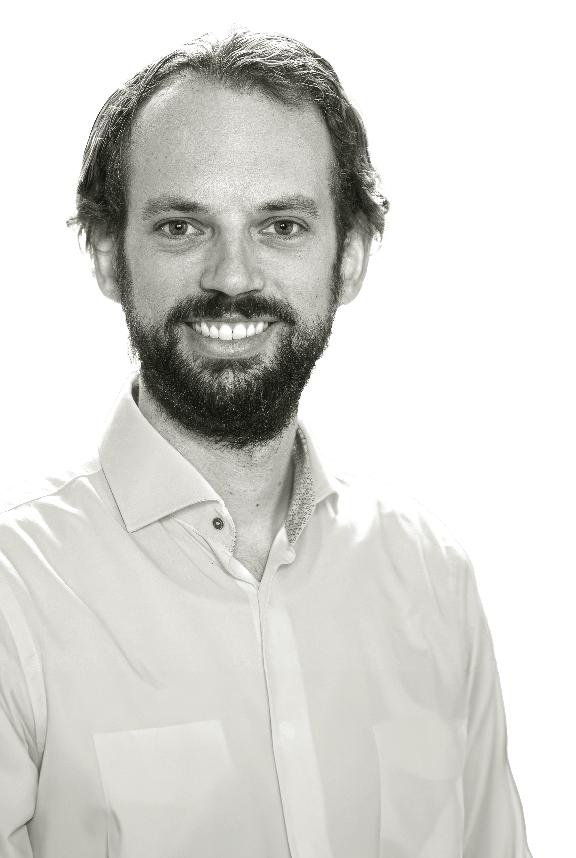
Hoonhout is more than happy to contribute to this as a teacher. And that’s an understatement. He used a Comenius Senior Fellowship for educational innovation to develop the course ‘Designing your life’. ‘It’s one of thirty electives we offer honours students in Leiden. Talented students often experience a lot of stress. They set the bar high for themselves, always wanting to get good marks. The course ‘Designing your life’ helps them with such things as dealing with perfectionism and realising there isn’t just one path that can make you happy. By interviewing working people, they discover that most of them didn’t follow a linear career path at all, but came across new opportunities along the way. This realisation helps students face the future with more confidence.’
Lessons from practice
The ability to respond quickly to the needs of students and to current events. To him, that’s where honours education’s biggest strength lies. ‘Take the developments with regard to Artificial Intelligence; our students must be able to respond to these in an agile way.’ Hoonhout says that Leiden University wants to bring students and professionals closer together. ‘We’re going to strengthen our ties with society and the business community, giving our knowledge exchange a boost. An example would be for an organisation like KPN to suggest a research question to the university. This allows students to familiarise themselves with the functioning and culture of a multinational company. It’s a win-win situation. Another major advantage is that it increases the likelihood of students ending up in the right workplace.’
THE TEACHER #1
15 YEARS OF HONOURS EDUCATION 2024 11
STUDENTS HAVE THEIR SAY
‘You
need a certain level of commitment’
Students Veerle Otterlo, Thomas van Poppel and Dominique Pilkes completed an honours programme. They did so in respectively higher professional, university and vocational education. The result was the same for all of them: an extra experience that will benefit them throughout the rest of their studies and careers.
Veerle van Otterlo (19) is enrolled in the Event Producer programme at the Tilburg regional training centre. She is in her second year and she is part of the Excellence group. ‘That’s what I call it at least. They asked me to join in the first year. My studies were going fairly well and I had room for something extra. When supervisors Lotte and Masha approached me, I said yes.’
With the group, which consists of both first- and second-year students, she takes workshops and goes on regular outings. ‘Sometimes during school hours and sometimes after. The other day we attended a lecture by TV presenter Leon van der Zande, which was inspiring. We also took a creative workshop on design. And we went to the Efteling for a peek behind the scenes at the Ravelijn theatre show. Which is very fitting given the programme we’re in.’
According to Van Otterlo, she was asked to join because of her good course results, but also because of her work ethics. ‘You need to have a certain level of enthusiasm and commitment, in addition to good marks of course. You have to really be up for it.’
It was an opportunity for the student to explore the subject matter in more depth. ‘And I met others outside school hours. I have a great relationship with the supervisors and I feel like I’m already reaping the benefits and acquiring new insights that aid my development.’
In the third year, her participation will end. ‘That’s why I’m shifting my attention to my internship. Preferably abroad, I’m thinking Valencia maybe. That will be another opportunity for personal development.’
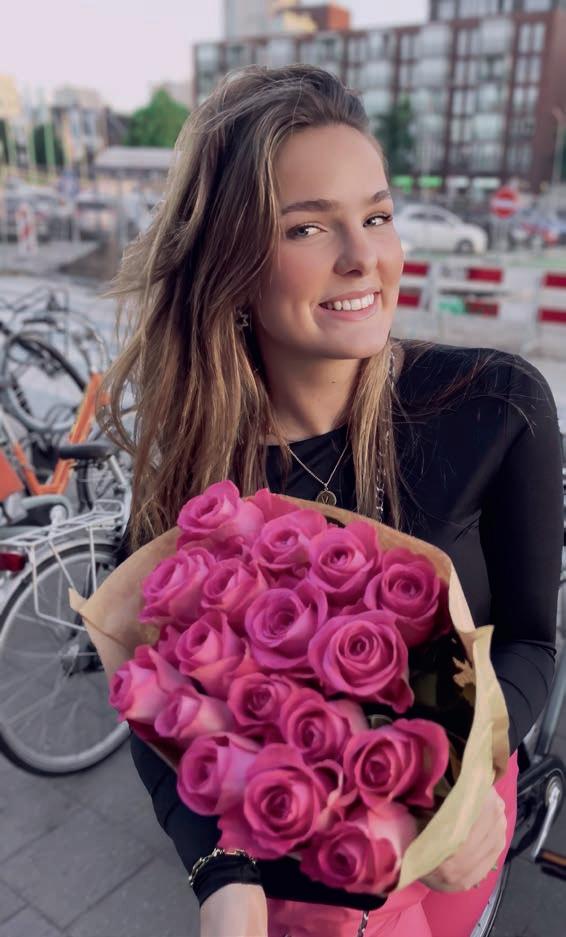
12
Text: Sandra Pool
Photos: Frans Nikkels and from personal archives
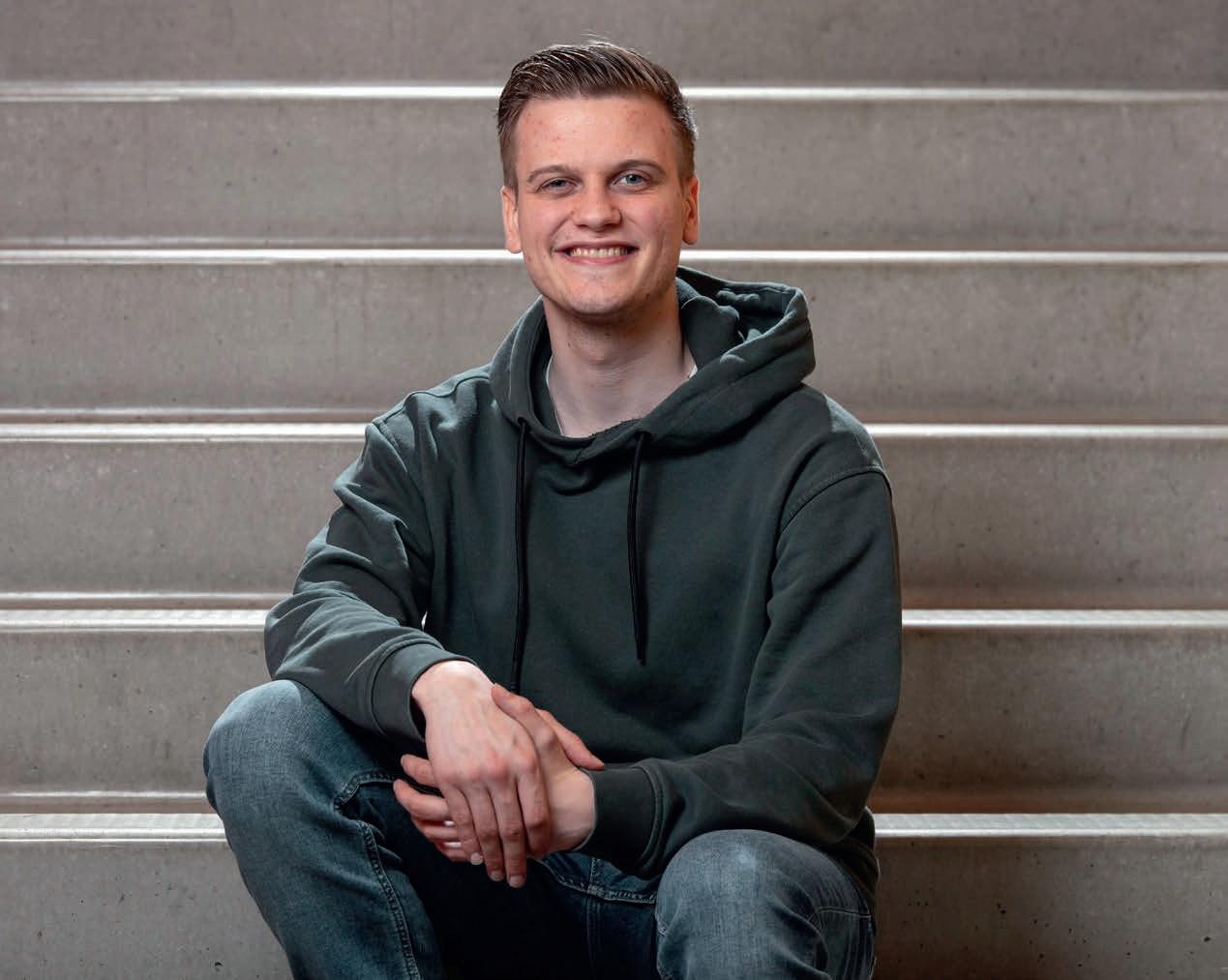
‘It
made me a different person’
Thomas van Poppel (24), is a Master’s student of Chemical Science and Engineering, University of Twente. He completed an honours programme during his Bachelor’s and is currently enrolled in one as a Master’s student. ‘I chose the track of most resistance.’

Whether he felt resistance to the Philosophy honours track? Yes, loads! Thomas van Poppel still remembers it vividly. ‘And that’s exactly why I chose that field of study. Philosophy was totally foreign to me. I had always found it a bit vague.’
Once he had made his choice, he went for it with an open mind. ‘I’ll never forget that first class. It was taught by Nolen Gertz, an associate professor of Applied Philosophy. He talked about the influential Greek philosophers Socrates and Plato. It was such a cool class! And it only got better after that.’
Van Poppel had already got his feet wet as a student when he started his Bachelor’s in Chemistry. ‘I started out in Physics, but I discovered Chemistry was a better fit for me. I’m from Tilburg myself, but some of my family live in Twente, which is why I chose Enschede.’ Once enrolled in the programme, it turned out there was room for something extra. ‘I’d always had the wish to complete an honours programme and this was the right moment.’
Van Poppel chose the track that held the least appeal to him. ‘I saw it like a personal challenge and an opportunity to develop. The programme broadened my view, it made me a different person.’ He took philosophy modules for a year and a half. ‘In the end we were about a dozen students, which was a good number for debates and in-depth exploration.’ Now that he’s a Master’s student, Van Poppel has once again enrolled in an honours programme. One that focuses on research this time. ‘I feel like doing a PhD would be rather boring, although I do like research in itself. This way, I’m hoping to find out if conducting research is my kind of thing.’
15 YEARS OF HONOURS EDUCATION 2024 13
‘A
great addition’
Dominique Pilkes (22) studies Creative Business, specialising in journalism and information, at Saxion University of Applied Sciences. She’s in her third year and enrolled in the honours programme as a first-year. ‘It worked out better than expected.’
She started her educational programme during the COVID pandemic. ‘My studies were going fine, I was on top of things and I didn’t have much to do besides, partly due to COVID. I found out there was an honours programme at Saxion and thought that would be a nice addition. My own programme is fairly applied and skills-oriented. It doesn’t explore the subject matter in great depth, as opposed to the honours programme.’
Pilkes is enrolled in the Changing Leadership track. ‘A higher professional programme is more geared towards ‘future employees’ rather than future managers or leaders. This track gives me the opportunity to learn about those things and develop the corresponding skills.’
The group convenes every Thursday. ‘At the start, my fellow
students would joke around and say that we would end up having drinks together every Thursday. I wasn’t so sure, but they’ve become my best friends.’
The group sees itself as an ‘organisation’, where everyone has tasks and responsibilities. ‘We are primarily concerned with completing and setting up the modules on Thursday. Secondary activities include recruitment and marketing.’ Feedback moments and a bit of coaching are also part of the track. ‘I’ve learnt to express myself in a slightly more nuanced way. We spend a lot of time on feedback and coaching. We’re on our way to becoming masters of reflection, partially because it’s such a nice group and my newfound friends hold up a mirror to me. These are skills that will benefit me for the rest of my life and it’s also great to have made such close friends of course.’
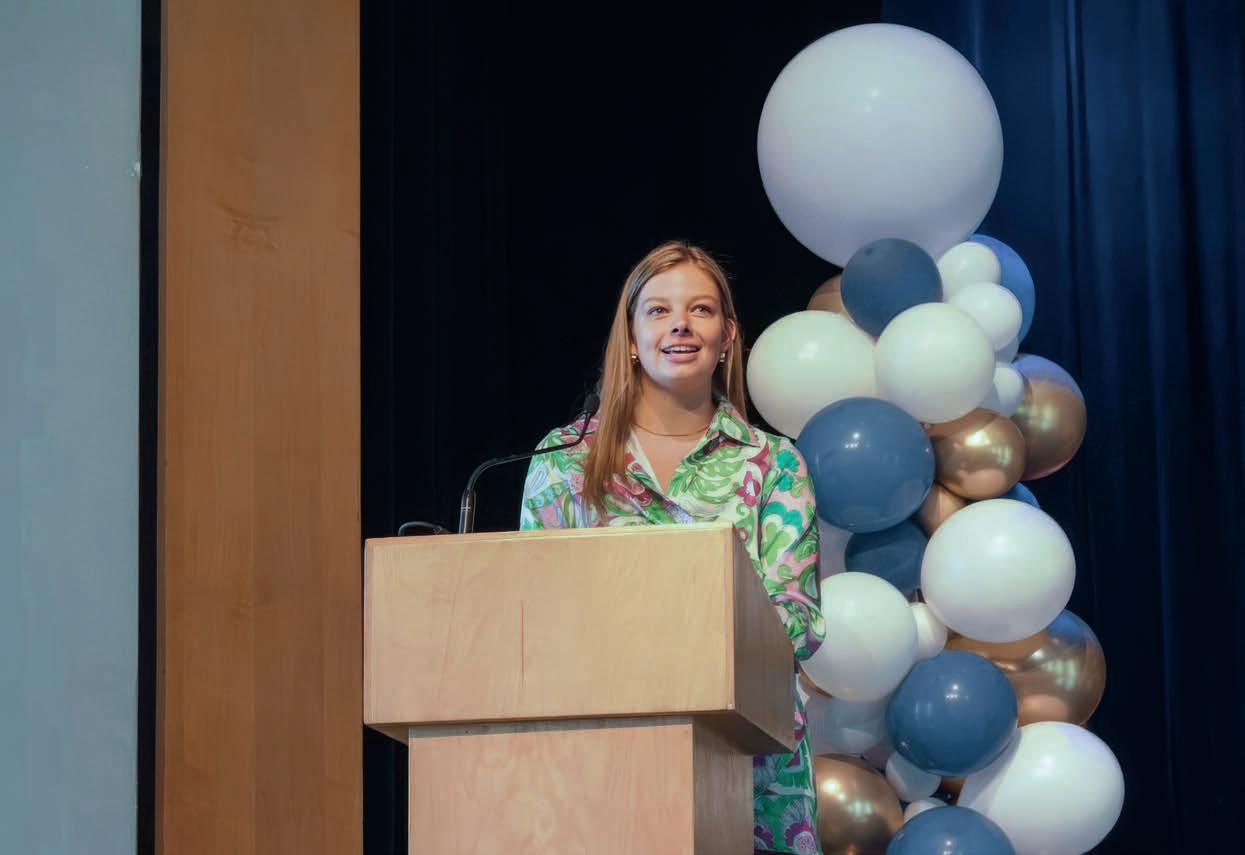
14
Text: Stan Waning Photo: From personal archives
‘There’s lots of room to experiment’
Masha Reijerkerk (33) is teacher Dutch at the Tilburg regional training centre and project leader at Stichting Netwerk MBO Excellent (MBOe).
What does the programme bring you as a teacher and project leader?
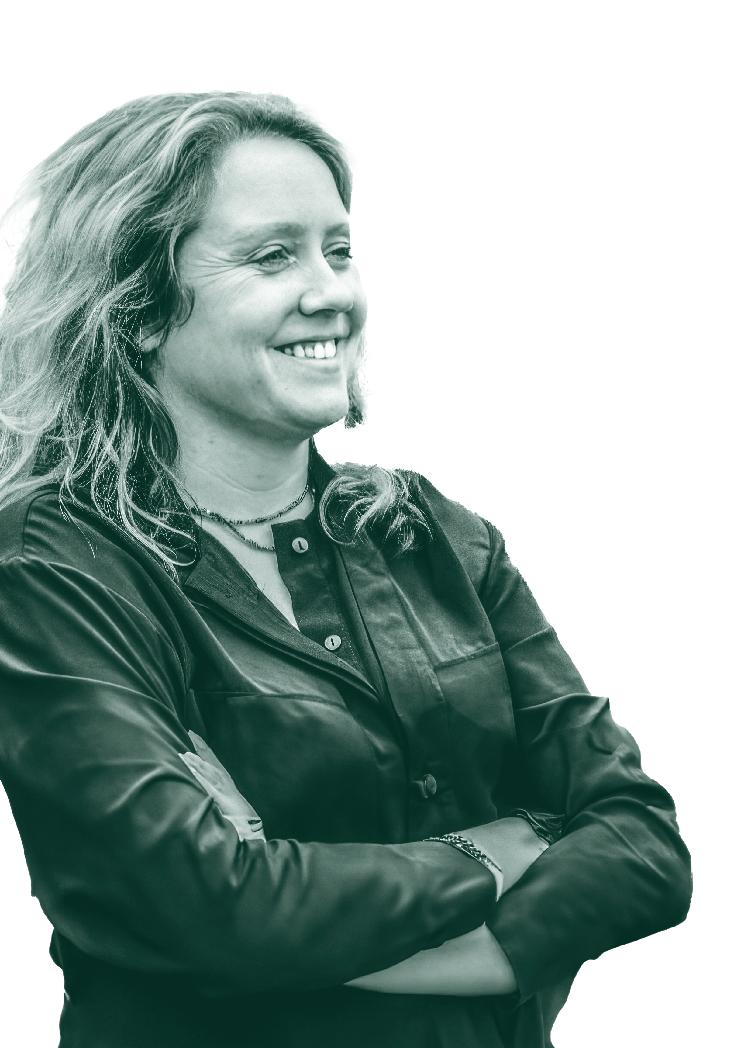
‘My role in the programme gives me tremendous freedom; there’s lots of room to experiment and I love that. The aspect of building something with the students also really appeals to me. Together, you take stock of what’s needed and collectively put together a programme spanning half a year. That’s really cool. Autonomy is key and I wish it were the same in regular education.’
What’s it like to teach this group?
‘It’s great. The relationships in class are totally different from regular education. We are peers rather than superiors and subordinates. So in the honours programme, I definitely don’t feel like a teacher in the traditional sense. Students teach you, as a teacher, to look at things differently. What’s nice is that a lot of students who are new don’t really know what they want or where their passion lies. They really get to know themselves and that makes for great interaction.’
Why did you take on a role in this programme?
‘I’m a great advocate of student autonomy. Here, I can experiment and take whatever works in class with me to regular education. That innovative character teaches me a lot, for instance to master new elements. And I love going off the beaten track.’
Does the programme have an appeal within senior secondary vocational education?
‘We’re taking big steps and we’re working on becoming more professional. We want to get into the professional field more and provide more workshops to showcase what we do. There’s something in the works, but it takes time to become visible.’
What improvements are needed?
‘Visibility, for one thing. We are doing good things, but people aren’t always aware. We don’t want to be a mere provider of education, but also a connecting force. People don’t realise how much we do, which is why we’re working on a new website, a more active LinkedIn presence and, hopefully, our own platform.’
THE TEACHER #2
15 YEARS OF HONOURS EDUCATION 2024 15
COMMUNITY BUILDING
Learning and socialising
You can stay in touch with fellow student during or after completing an excellence or honours track. In the interest of community building, many education institutions have set up associations. The activities they organise can be educational or social, such as monthly get-togethers or galas. Below, some of the initiatives are featured.
Lecture and painting session Members of the University of Groningen honours association (HCSA) attended an interactive and creative lecture by Andreas Blühm, creative director at the Groninger Museum. He talked about the museum’s strategies for engaging a younger audience.
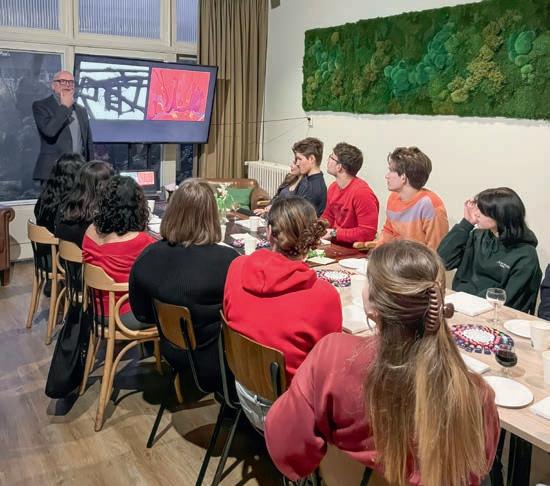
A gala, entitled Among the Stars, was organised by the Nijmeegse Studenten Honoursvereniging at De Waagh March 2024.

Honours students of Utrecht University during the Kick-off of the Honours Year event 2023 (photographer: Janus van der Eijnden)

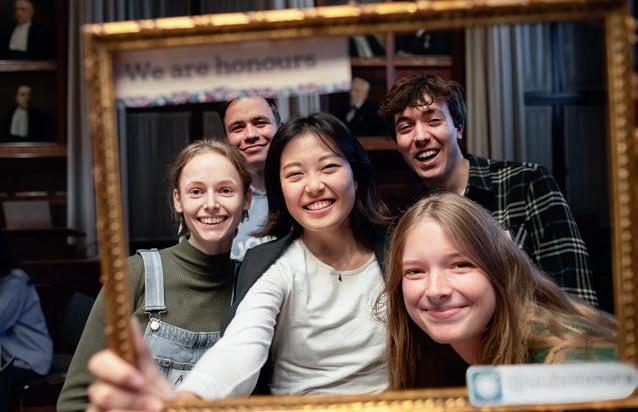
16

Students from the Event Producer course at ROC Tilburg took a look behind the scenes of the then TV programme Khalid&Sophie.
The Second Monday Of The Month Drinks is the monthly get-together of Honours Vereniging Ockham, the University of Twente’s honours association.


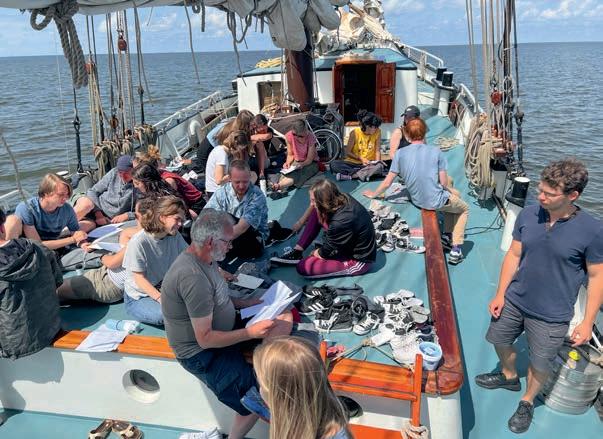
Plenary session of the Bachelor’s honours programme of the University of Twente in March 2024, where honours students from different years and tracks got to know each other and/or attended special educational sessions and workshops.
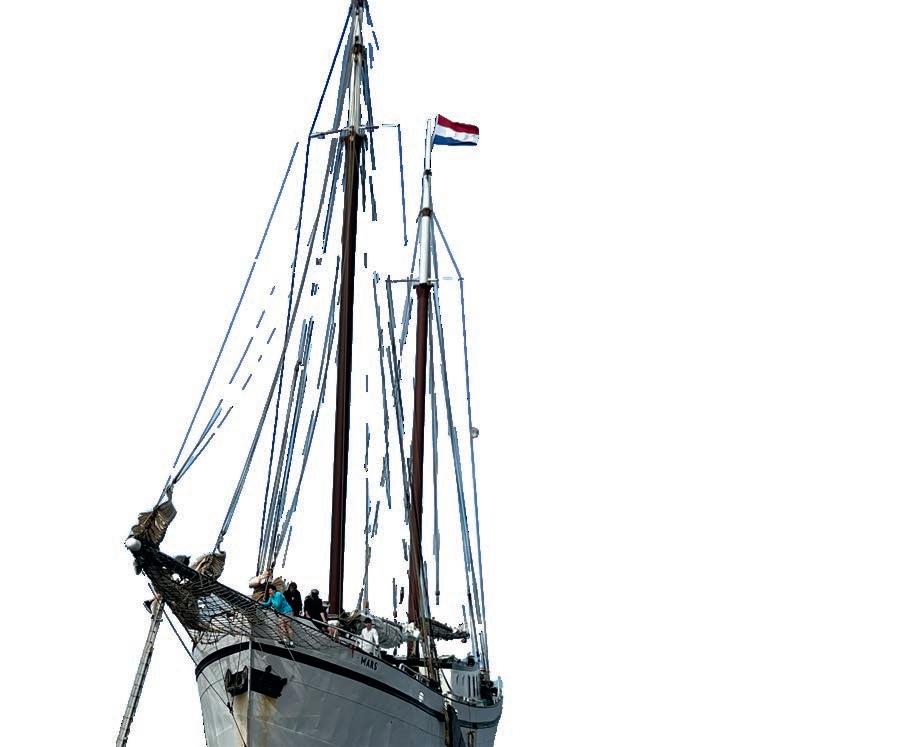
The Waddenlab is an educational event for honours students in senior secondary vocational education, higher vocational education and university education, who spend one week sailing the Wadden Sea to understand the complexity of this nature reserve.
17 15 YEARS OF HONOURS EDUCATION 2024
‘It ticked all the right boxes’
What do students get out of completing the honours programme? Why did they choose it and what were the challenges? Three alumni, Chantal van der Louw (higher professional education), Tjo-Kin Man (university education) and Moïsha Meeng (vocational education), tell us about their experiences.
‘I preferred the programme to my own’
Chantal van der Louw (25) European Studies (higher vocational education) NHL Stenden
Leeuwarden 2018 - 2022
Current position: administrative position in the social domain
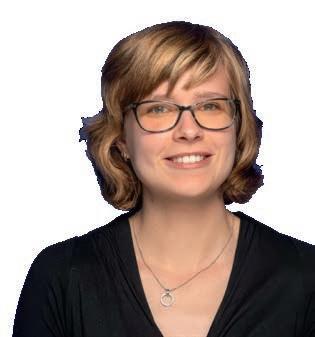
What
made you choose the honours programme?
‘I already chose the programme in my first year, because I wasn’t completely happy with my regular programme. It’s not like I had to drag myself to class, but I felt I could do more and was therefore looking for an extra challenge. Then I learned about the honours programme. It ticked all the right boxes and I preferred it to my own programme in European Studies. It all went smoothly. In the first two years, everything was very flexible and this made it easy for me to combine my own programme and the honours programme. Things got a bit trickier in the third year, although the COVID pandemic actually worked in my favour. I had to spend half a year abroad as part of my own programme, but as the honours programme was teaching online sessions, I could keep participating from Poland.’

What did you get out of it?
‘I got to spend a lot of time working on my development and took all kinds of interesting classes, for instance on personal leadership. I also made a great friend in the programme and there was a lot of room to experiment. I really appreciated the freedom we had and got the opportunity to organise sessions to teach some things to fellow students with completely different backgrounds.’
Are you still benefiting from the experiences you had?
‘Yes, without a doubt. This is mainly thanks to how diverse the participants in the programme were. We were all in different programmes, but we got along really well. I remember how welcome everyone made me feel when I started and we always paid it forward by giving students that came after us a warm welcome. When I interact with other people, I try to replicate this.’
What were the biggest challenges for you?
‘In the last year in particular, the honours programme sometimes posed a number of practical challenges. As I was doing an internship, I couldn’t be present for everything. This also meant I wasn’t able to finish my honours programme at the same time as my own programme. And I had to take care not to translate the freedom and the rhythm of the honours programme to my own programme, where arrangements were slightly stricter.’
18
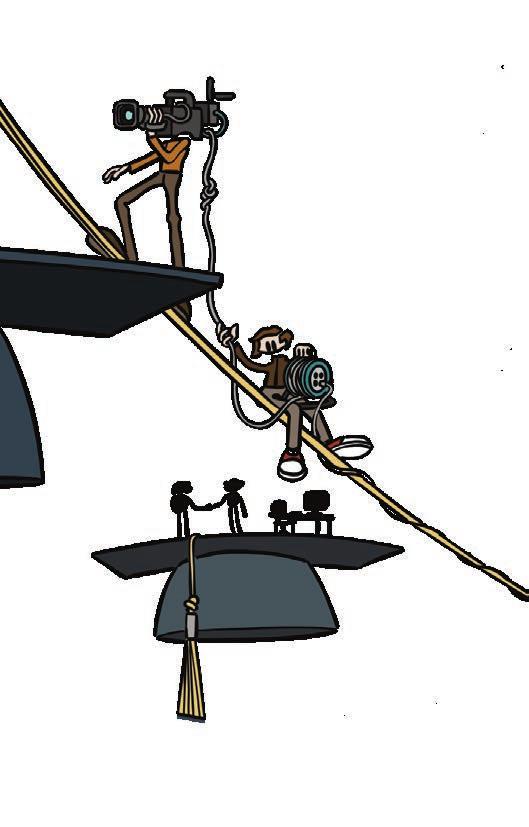
What made you choose the honours programme?

‘I was particularly impressed by the depth of the programme’
Tjo-Kin Man (26)
Bachelor and Master of Business & Information Technology University of Twente 2016 - 2022
Current position: Senior Technology Consultant at Valcon
Are you still benefiting from the experiences you had?
‘I was looking for an academic challenge alongside my studies, but also for a way to make contact with other disciplines. In my opinion, you need to bring multiple disciplines together in facing the challenges of the future. I considered signing up for a student team, but that would mostly involve practical challenges and I preferred the academic aspect of honours. I was particularly impressed by the depth and breadth of the programme. I participated in the honours programme as a student for a year and a half, and then I went on to work within the organisation.’
What did you get out of it?
‘Looking at a problem from different viewpoints. These may be cultural differences, but also knowledge or the way you experience something. Everyone looks at a problem from a different angle and this realisation was immensely useful. To tackle major problems in society, we need people who build bridges between all kinds of disciplines. So you have all sides of the problem covered, as it were. This became very obvious as the programme progressed.’
‘I’m a technology consultant at an IT company and work with people from all kinds of different backgrounds. Every day I deal with colleagues from IT and HRM, as well as project managers and finance people. They all have different views of a case, and their own concerns and needs. My experience at the honours programme allows me to reconcile all of those viewpoints. I’m convinced that it’s much better to tackle a case with all of those people than with just people from the finance department.’
What were the biggest challenges for you?
‘The programme didn’t pose any major challenges to me. I was doing well in my own programme and didn’t need to spend a whole lot of time studying for it. This meant I had loads of time for something extra, so I participated in the honours programme two evenings a week. This left me with a little bit less time for social activities than some other people, but that wasn’t an issue. Now and then I had to get a bit creative with my calendar and there were also a few extra cycling trips to Enschede, but in general everything was very manageable.’

15 YEARS OF HONOURS EDUCATION 2024 19
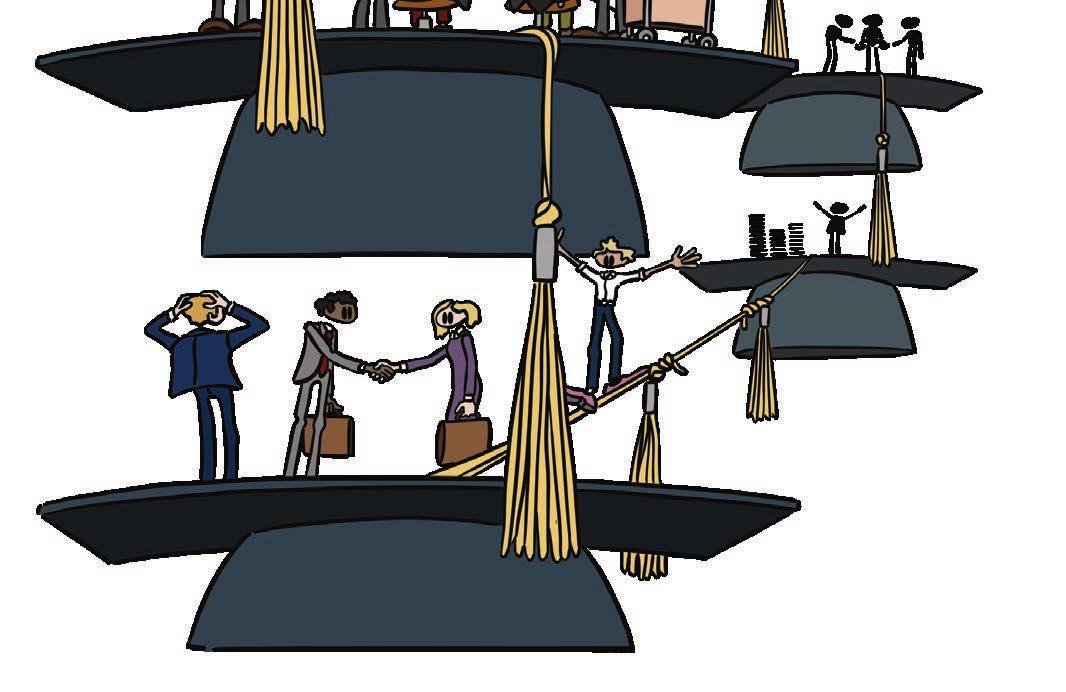
What made you choose the honours programme?
‘I wasn’t forced to sign up for the programme, which is actually called the Skill Heroes programme at our institu tion, but I was urgently requested to do so by my teacher. I started in pre-university education, but due to a difficult period in my life I reverted to senior secondary vocational education and I didn’t really know what to do with myself. I did well in the event organisation officer programme and I started enjoying school again. I started doing better and better. I was breezing through my programme, so my teacher thought the Skills Heroes programme would suit me. A brilliant move on her part, even though at first I was less than thrilled about it.’
What did you get out of it?

‘In retrospect, signing up for the programme turned out to be a brilliant move’
Moïsha
Meeng (24)
Event organisation officer and marketing and communication (senior secondary vocational education) Tilburg Regional Training Centre (ROC) 2016 - 2019
Current position: founder of Juiced Concepts
‘So very much. Even if something feels uncomfortable, you have to go all out and not second-guess yourself. That’s my mindset now. Keep on going! Not only did it get me an enriching experience and a nice addition to my diploma, but it also provided me with a welcome impetus during my teenage years. And I learned not to have preconceived judgements. I met people that were totally unfamiliar to
me and even spent an entire weekend with them in Zwolle. I made up all kinds of excuses to not have to go, but in the end I had a great time and went through a personal development.’
Are you still benefiting from the experiences you had?
‘Faith in myself. The programme brought me a lot of good things. I carried around so many insecurities, but in the programme I learned to appreciate myself more. I still benefit from this. I also learned to adapt to situations and in retrospect it was great for my network. I regularly have professional contact with people who were affiliated with the programme.’
What were the biggest challenges for you?
‘That was without a doubt the mental threshold I had to cross. I was extremely tense about meeting all those new people. This caused me a lot of stress, but looking back I’m very happy my teacher virtually forced me to sign up for the programme.’
20
Text: Rense Kuipers Photo: From personal archives
‘Honours students are driven by substance’
Ron Weerheijm manages the honours programme at Rotterdam University of Applied Sciences. He shares his views on the archetypical honours student and the role of teachers.
In your opinion, what makes a typical honours student?
‘A student who’s aware of their own qualities, engaged in societal issues, motivated to help solving them, and open to reflection and feedback of peers. Above all, they’re people who are looking for self-fulfilment. It’s actually a type of student who’s not a great fit with regular education.’
That sounds rather ambitious...
‘What’s funny − and special − is that it’s not about ambition or competitive urge. That is, not for the honours students themselves. This has actually been researched: non-honours students mainly saw the ambition of honours students, whereas the latter group don’t consider themselves ambitious. In the end, they’re not in it to get a high mark, but to delve into the subject matter. What typifies honours students is that they’re driven by substance.’
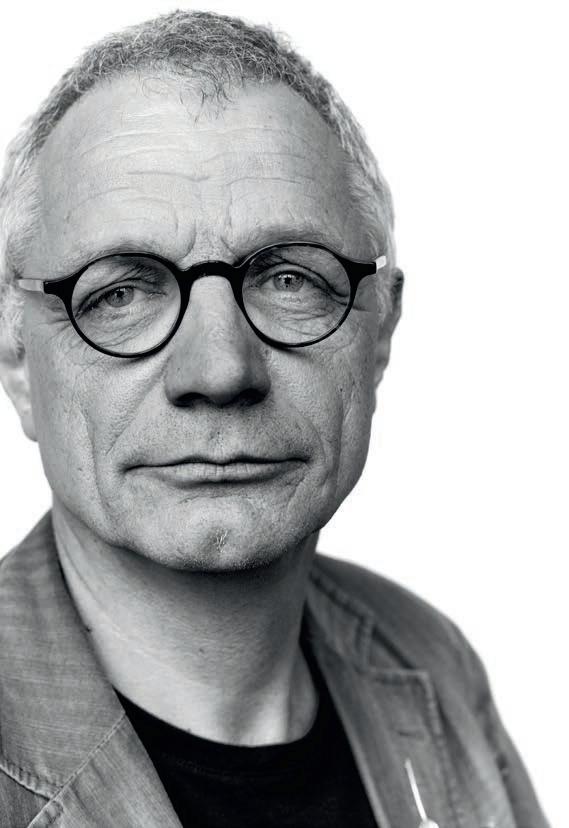
What role does the teacher take in facilitating this drive?
‘Attention. Just attention. I’ve seen students that felt trapped in their regular educational programme, only to flourish once they enrolled in honours education. You have to know what they’re about and how you can relate to that. Interpersonal contact is everything. It’s not for every teacher. You’re often blazing a trail together with the student.’
How do you go about this at Rotterdam University of Applied Sciences?
‘The terms depth and breadth are often used when talking about honours tracks, but we like to use the term enrichment. Our programme features an honours coach who helps students with their awareness and capacity for reflection. Community gatherings, such as dinners, lectures and workshops, are also important.’
What do you see as points for development or improvement when it comes to honours education in the Netherlands?
‘It bothers me that we haven’t found a good name for this type of education yet. It’s not the same as the excellence education that was invented in the US. What’s more, ‘honours’ is an English word and we’d like to have a Dutch one for this somewhat heterogenous group of students that aren’t in it for the honour, but for self-fulfilment. The Inuit have dozens of words for snow, but we haven’t found the right one for this type of students. Not yet, in any case.’
THE TEACHER #3
15 YEARS OF HONOURS EDUCATION 2024 21
‘Proud that our approach is working’
In addition to teachers and students, the honours programme involves many coordinators and programme directors. With their limitless enthusiasm, they work tirelessly behind the scenes to keep the programmes up and running. What motivates them? And what does the honours programme mean to them? Five of them take the floor.
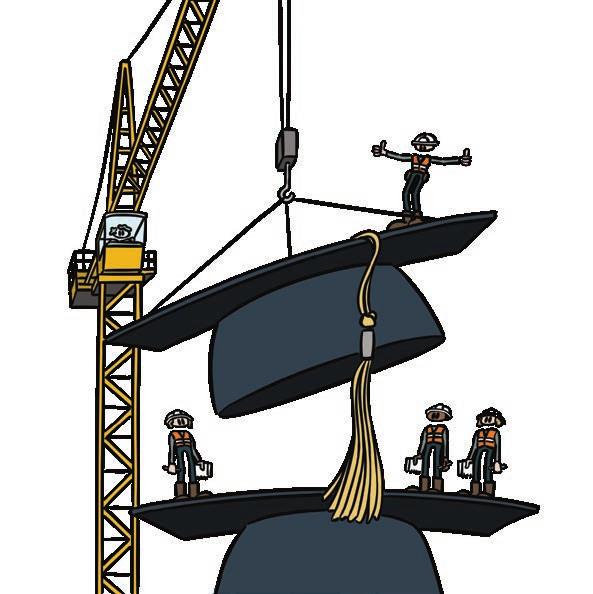

Driving forces
‘Honours programmes are designed to pique the broad, intellectual interest and curiosity of outstanding students. This is why honours education offers more freedom than regular educational programmes, although it’s definitely not free of obligation. On the contrary: we expect students to put all of their talents, and the energy we invest in developing those, towards solving societal challenges. We also expect them to work together to come up with creative, innovative and interdisciplinary ideas. When I look around and see where alumni of our own honours programmes ended up, as driving forces and connectors, I can’t help but feel proud that our approach is working.’
Nelleke van Adrichem, Programme Director University of Twente Honours programmes
Outside the box
‘For me, it is very important to prepare young academics to contribute to solutions of actual societal challenges. By having interdisciplinary knowledge, extended skills and societal engagement, students will be able to work on ‘outside the box’ solutions. By learning, educating and organising ‘outside the box’, the Honours Academy of the Leiden University builds on transdisciplinary and innovative educational programmes for scholars, bachelor students and master students. We are proud to work together with more than 250 staff members of all faculties of the University, and many societal partners.’
Jacobijn Gussekloo, Professor Primary Care Medicine, Leiden University
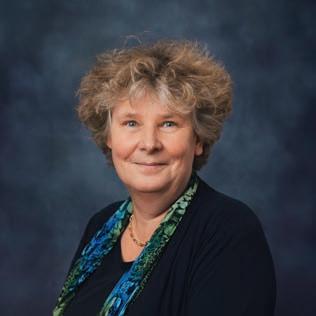
22
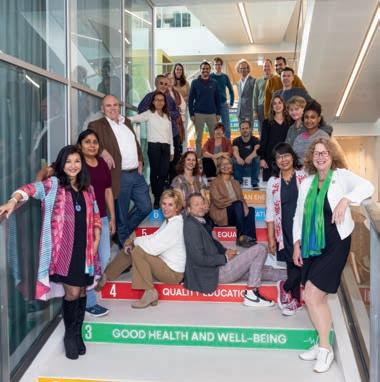
Explore talents
‘Being the proud director of the honours Bachelor of Business Administration in Global Project and Change Management, I wish every student an honours educational experience. Fifteen years of honours education have strongly influenced the innovation of Dutch higher education. It has paved the way for the rise of multidisciplinary collaboration, the value of authentic assignments, for the importance of personal learning journeys as well as the strength of learning communities. Honours education gives young people the opportunity to explore their talents and strengths, and to do good for society and planet. In other words, honours education is education that matters.’
Lineke Stobbe, Director Global Project and Change Management, Windesheim Honours College
The extra bit
‘As a coordinator for the Master Research Honours programme, for me, honours means supporting every year a group of students in their journey to develop themselves as future and engaged researchers. By offering a diverse programme with a variety of workshops and trainings as well as individual coaching on skills and knowledge they nowadays need as researcher, I see the students change, grow and become more self-aware. In the group and as a group they learn from other experiences and from each other. Both the efforts from the team of teachers, their supervisors, as well as their own input contribute to deepened insights in the life of a researcher. Honours prepares them for a role as researcher that is more varied and sometimes more challenging than ever. Empowering the students for continuous development is most rewarding. It is the extra bit that honours offers.’
Anne M. Dijkstra, assistant professor in science communication and engagement, coordinator Master Research Honours programme University of Twente

Topical and challenging
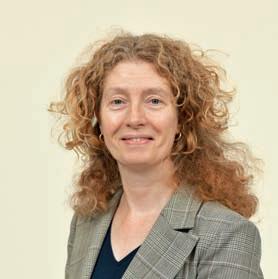
‘To me, honours means creating the best possible learning environment for students who have the ability, the desire and the courage to do more. With these programmes, we meet the educational needs of students who are looking for a safe way to think outside the box, thereby empowering them to continue exploring and developing their talents. In addition, honours mostly takes place outside the curriculum, which gives this form of education the flexibility and pace it needs to respond to current themes, trends and developments. This makes honours topical and challenging, both for the students and teachers involved. Finally, honours means a valuable community for students and teachers. It’s a respectful and stimulating environment where everyone focuses on development and fulfilment. To be part of that, and contribute to that, is something I hold very dear as a coordinator.’
Fabienne Crombach, Senior Coordinator Excellence Education, Maastricht University
15 YEARS OF HONOURS EDUCATION 2024 23

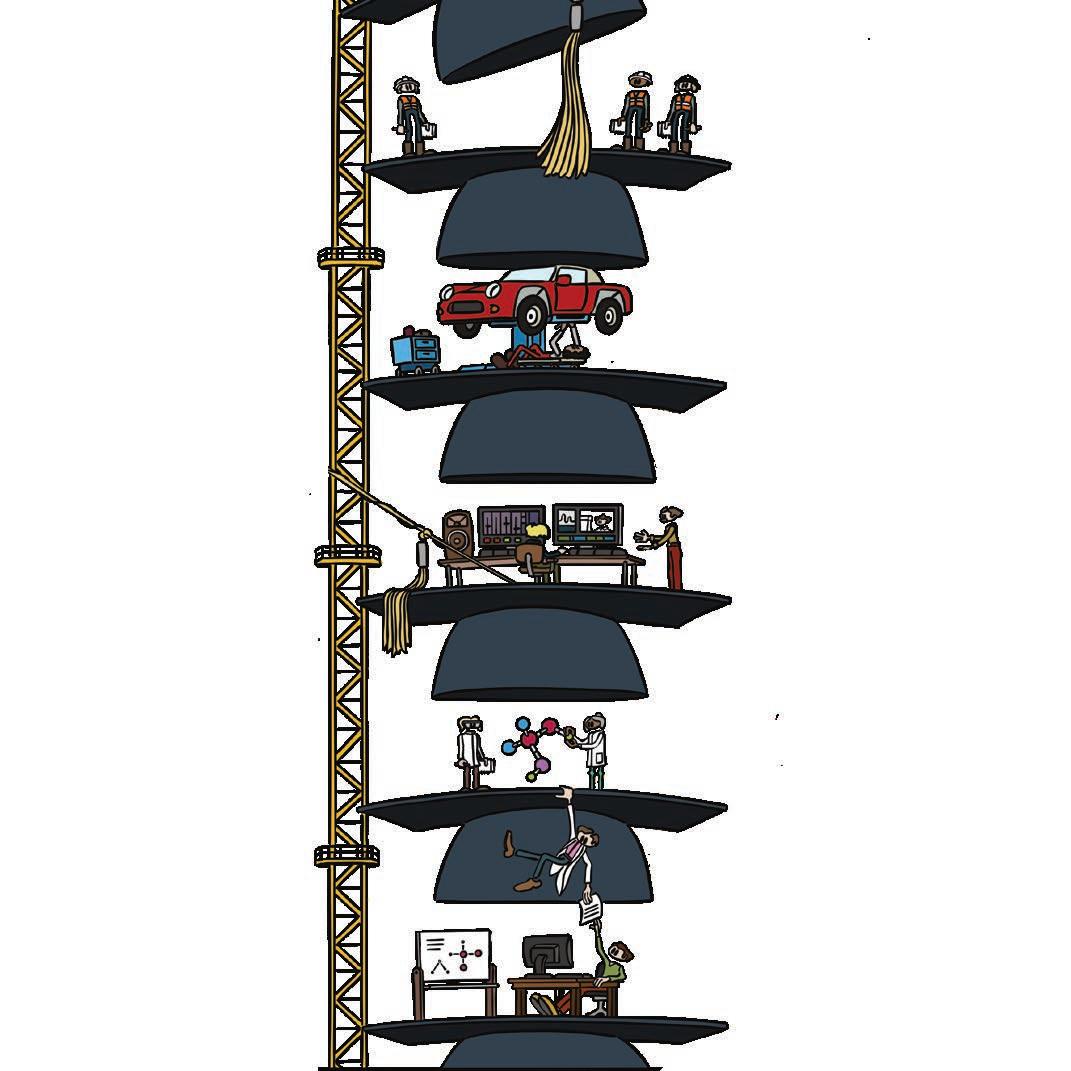 Cartoon: LUVANE
Cartoon: LUVANE












































 Cartoon: LUVANE
Cartoon: LUVANE